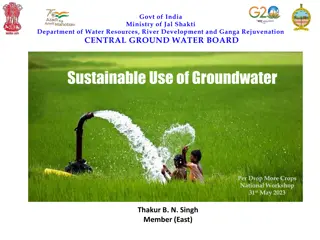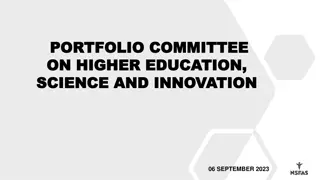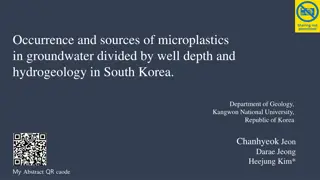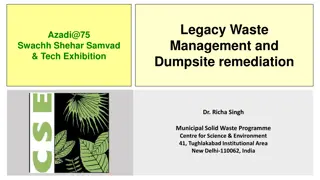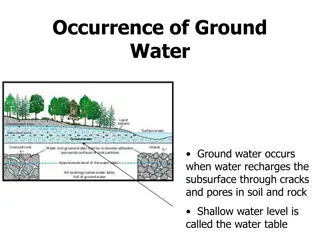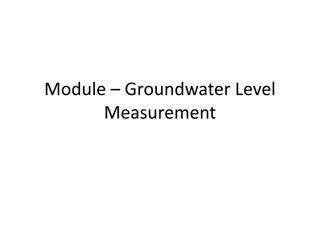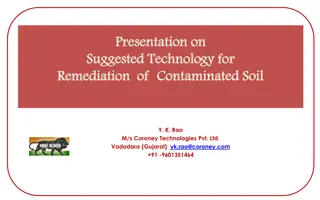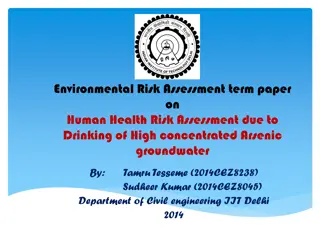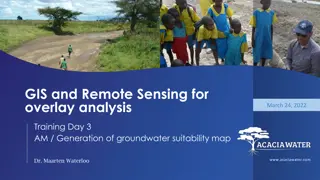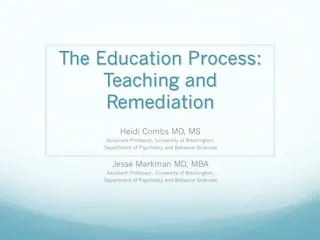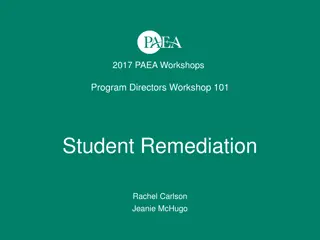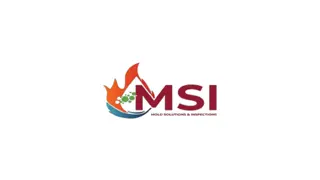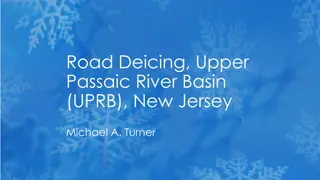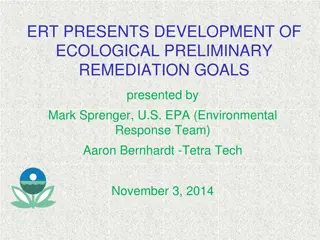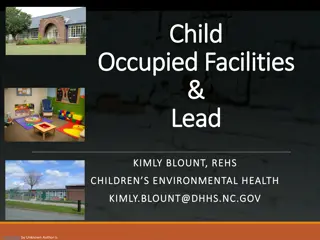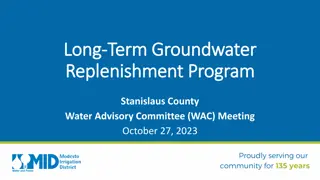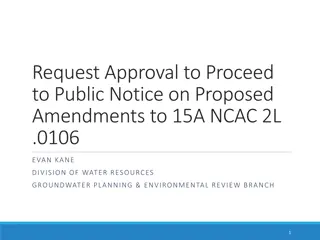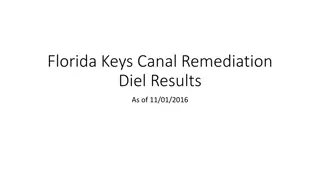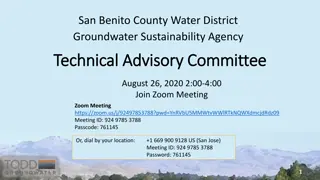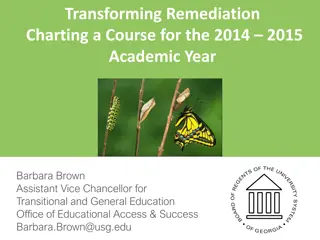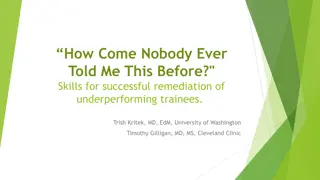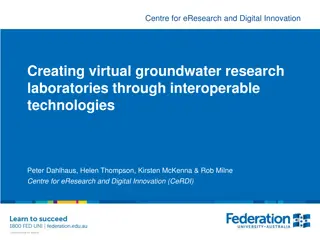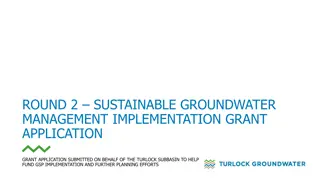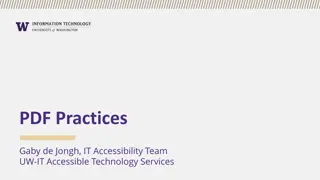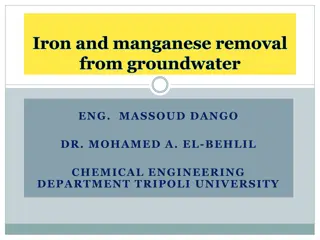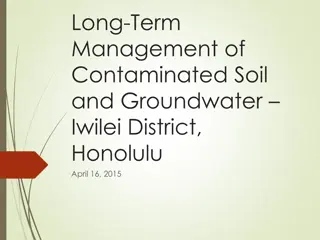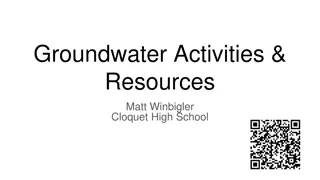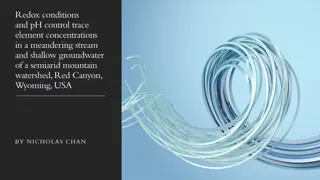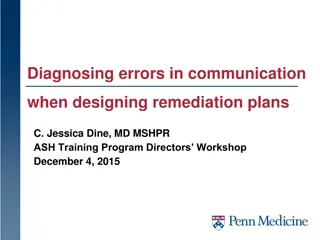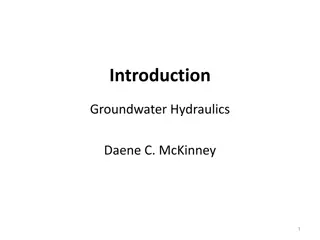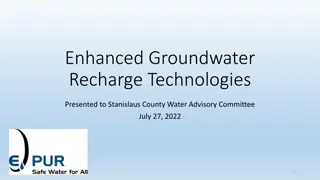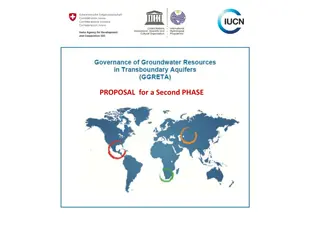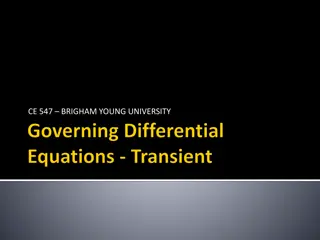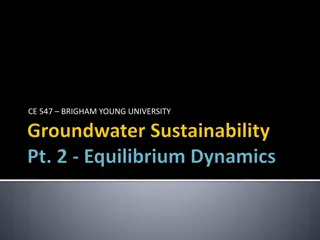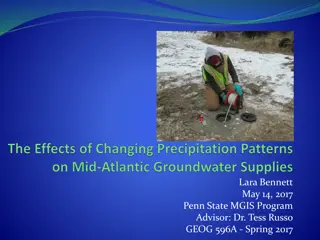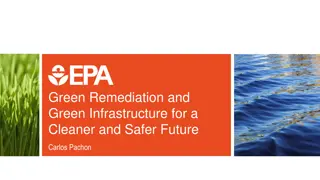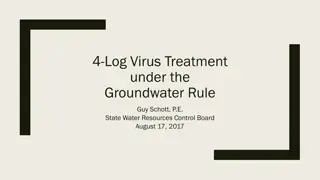Sustainable Use of Groundwater
Groundwater management and sustainable use are crucial in India, as highlighted by the Ministry of Jal Shakti. The country faces challenges such as declining groundwater levels, quality deterioration, and increasing demand-supply gaps. Effective strategies and responsible practices are needed to add
0 views • 20 slides
Funding Outcomes Remediation Process in Higher Education and Science Innovation
A detailed account of the remediation process undertaken by the Portfolio Committee on Higher Education, Science, and Innovation concerning funding outcomes for students. Issues such as processing gaps, hybrid applications, and missing parental relationships led to a review of funding decisions. The
3 views • 24 slides
Groundwater Recharge Station Project
The Groundwater Recharge Station Project, Project Number 21-381, at California State University, Stanislaus involves the construction of a groundwater recharge station. The notice to contractors provides details on bid proposals, project scope, budget estimate, project duration, and prequalification
0 views • 19 slides
Microplastic Occurrence in South Korean Groundwater by Well Depth and Hydrogeology
The study conducted by Kangwon National University in South Korea analyzed microplastic occurrence in groundwater from wells of varying depths and hydrogeological settings. Samples were collected from the National Groundwater Monitoring Network pipes in Gapyeong and Chuncheon. Water type analysis re
7 views • 6 slides
Challenges and Solutions in Legacy Waste Management and Dumpsite Remediation in India
Legacy waste and dumpsites in India pose significant environmental and health hazards due to mismanagement over decades. The presentation highlights current status, composition of waste fractions, remediation approaches like bio-capping and biomining, challenges faced, and the role of initiatives li
0 views • 22 slides
Understanding Groundwater: Occurrence, Recharge, and Movement
Groundwater occurs when water seeps into the subsurface through cracks and pores in rocks and soil, forming the water table. Recharge happens naturally through processes like precipitation and snowmelt, as well as artificially through methods like recharge wells and water spread over land. The movem
0 views • 8 slides
Understanding Groundwater Level Measurement Technologies
Groundwater levels are commonly measured using submersible pressure transducers, with data loggers used for monitoring and recording. Different options such as vented vs. non-vented systems, battery voltage considerations, and specifications for pressure sensors are discussed. Additional equipment l
0 views • 12 slides
Advanced Technology for Soil Contamination Remediation
The proposed technology utilizes a High Vacuum, Low Temperature Thermal Desorption Process to effectively remediate contaminated soil, achieving targeted mercury levels in an environmentally friendly manner. Key features include dry processing, no emissions into air or water, electronic control syst
0 views • 10 slides
Human Health Risk Assessment due to High Concentrated Arsenic in Groundwater
This term paper focuses on assessing human health risks associated with elevated levels of arsenic in drinking groundwater. Various exposure routes and sources of arsenic contamination are investigated, leading to a comprehensive risk assessment. The results indicate non-carcinogenic effects and pot
0 views • 6 slides
Groundwater Suitability Mapping Training Overview
The training program focuses on GIS and Remote Sensing for overlay analysis, with an emphasis on generating groundwater suitability maps. Dr. Maarten Waterloo leads the session, covering topics like data processing, automation, and sensitivity analysis. The program includes hands-on activities and e
0 views • 14 slides
Strategies for Effective Teaching and Remediation in Education
Explore the education process, teaching methods, and remediation strategies in the field of psychiatry and behavior sciences. Learn how to identify learners needing remediation, diagnose deficits, create remediation plans, and assess effectiveness. Dive into group discussions, review experiences, te
0 views • 50 slides
Understanding the Thin Line of Remediation in PA Education
Explore the challenges and goals of remediation in physician assistant (PA) education, delving into the importance of addressing deficiencies while avoiding spoon-feeding. Learn how to align institutional principles with remediation strategies to provide second chances for students with diverse need
0 views • 18 slides
Professional Mold Remediation Solutions Services
We offer mold remediation service involves a series of steps that enable us to perform a thorough process Work with MSI today for professional mold solutions. \/\/ \/services\/mold-remediation
0 views • 16 slides
Impact of Road Deicing Salts on Water Quality in Upper Passaic River Basin
An in-depth geochemical analysis conducted by Dr. Michael A. Turner and Dr. Duke U. Ophori studied the impact of road deicing salts on groundwater quality in the Upper Passaic River Basin, New Jersey. The study focused on major ions in groundwater, statistical analysis of ion concentrations, correla
0 views • 19 slides
Eco-Remediation Goals Development Training Overview
This presentation by Mark Sprenger from the U.S. EPA discusses the development of Ecological Preliminary Remediation Goals (PRGs). It covers the process steps, assumptions, risk information activities, and resources related to ecological risk assessment within the EPA's programs. The training module
0 views • 53 slides
Lead Poisoning Investigation and Remediation in Child-Occupied Facilities
Explore the protocols and requirements for lead investigations, remediation efforts, routine sanitation inspections, and monitoring in child care centers and schools to ensure the safety of children from lead hazards. Learn about lead poisoning thresholds, hazard identification, XRF testing, and mor
0 views • 25 slides
Sustainable Groundwater Management in Stanislaus County: A Comprehensive Overview
Long-term groundwater replenishment programs, pumping policies, and the Sustainable Groundwater Management Act (SGMA) are crucial for managing water resources in Stanislaus County. The Modesto Irrigation District's (MID) efforts in conjunctive use, groundwater recharge projects, and public outreach
2 views • 10 slides
Groundwater Contamination Rule Amendments Proposal
Proposed amendments to NCAC 15A.2L.0106 focus on establishing default cleanup requirements for groundwater contamination and providing options for remediation. The amendments aim to clarify compliance boundaries, correct terminology inconsistencies, and enhance rule effectiveness.
0 views • 8 slides
Understanding the Importance of Soil and Groundwater Measurements
Explore the significance of infiltration and hydraulic conductivity measurements in environmental studies, training sessions offered by Eijkelkamp Training & Consultancy, and various reasons for conducting measurements such as defining drain distance, disconnecting rainwater, soil and groundwater po
0 views • 55 slides
Analysis of Florida Keys Canal Remediation Diel Results
The analysis focuses on the diel results of a canal remediation project in the Florida Keys as of 11/01/2016. It includes measurements of %DO saturation above 42% and the average %DO saturation over a full day, with data points on control and remediated surfaces. Significant improvements are observe
0 views • 18 slides
San Benito County Water District Groundwater Sustainability Agency Technical Advisory Committee Meeting Summary
The San Benito County Water District Groundwater Sustainability Agency Technical Advisory Committee met on August 26, 2020, to discuss various topics including update on GSP schedule, setting sustainability criteria, and monitoring for subsidence issues. The meeting highlighted the need for more sys
0 views • 33 slides
Transforming Remediation: A Course for the 2014-2015 Academic Year
Barbara Brown, Assistant Vice Chancellor for Transitional and General Education, outlines the journey towards transforming remediation in education. The plan involves task forces, ad hoc committees, regional workshops, and policy committees. The focus is on corequisite remediation, where students re
0 views • 25 slides
Skills for Successful Remediation of Underperforming Trainees
In this resource, Trish Kritek, MD, EdM, from the University of Washington, and Timothy Gilligan, MD, MS, from the Cleveland Clinic, share insights on remediation strategies for underperforming trainees. Key concepts include focusing on outcomes, providing structure and accountability, honing commun
0 views • 30 slides
Virtual Groundwater Research Lab Solutions
CeRDI from the Centre for eResearch and Digital Innovation focuses on creating virtual groundwater research laboratories using interoperable technologies. They address challenges such as providing access to complex data, incorporating qualitative and quantitative data into models accurately, harness
0 views • 21 slides
Sustainable Groundwater Management Grant Applications Update
An update on the Round 2 Sustainable Groundwater Management Grants, including details on the grant application process, funding availability, application submissions, and project components. The applications are part of efforts to support sustainable groundwater management in the Turlock Subbasin an
0 views • 6 slides
UW IT Accessibility - PDF Practices and Tools
UW-IT's Accessible Technology Services department at the University of Washington outlines their in-house PDF remediation practices, tools used, handling of complex forms, and available resources for PDF accessibility. They utilize tools like Adobe Acrobat Pro DC, ABBYY FineReader, PAC 2021, and JAW
0 views • 6 slides
Iron and Manganese Removal from Groundwater Study
Iron and manganese are common natural elements in groundwater, but their presence can lead to various issues such as metallic taste, staining of clothes and fixtures, and growth of iron bacteria. This study aims to analyze groundwater wells in Libya, identify high levels of iron and manganese, and p
0 views • 29 slides
Enhancing Flow Opportunities in Scott Valley Groundwater Study
The Scott Valley Groundwater Study identifies flow enhancement opportunities to improve water management and increase stream flows. Initiatives include developing an integrated hydrologic model, exploring water management strategies, and implementing groundwater recharge projects since 2008. The stu
0 views • 6 slides
Long-Term Management of Contaminated Soil and Groundwater in Iwilei District, Honolulu
The Iwilei District in Honolulu, Hawaii, spans 315 acres with multiple landowners and responsible parties. It features commercial and industrial use, including bulk fuel terminals, former MGP site, active/inactive petroleum pipelines, and Dole Cannery. The area has been impacted by petroleum-contami
0 views • 25 slides
Human Impacts on Groundwater Systems in Minnesota: A Study of Interactions and Solutions
Explore the intricate relationships between human activities and groundwater systems in Minnesota through investigations, models, and technological solutions. Utilize place-based evidence, including insights from Minnesota American Indian tribes and cultures, to understand and address climate change
0 views • 7 slides
Redox Conditions and pH Control in a Mountain Watershed: Study in Red Canyon, Wyoming, USA
Exploring redox conditions and trace element concentrations in a semi-arid mountain watershed, this study in Red Canyon, Wyoming, delves into the impact of oxic surface water and anoxic groundwater on trace element cycling. The investigation aims to enhance understanding of seasonal variabilities, f
0 views • 11 slides
Enhancing Communication and Remediation Strategies in Medical Education
This content explores diagnosing errors in communication and designing remediation plans in medical training. It covers topics such as coaching plans for millennials, remediation assessments, and case studies like Tim, a first-year fellow facing interpersonal challenges. Strategies for addressing de
0 views • 15 slides
Understanding Groundwater Hydraulics and Hydrology
Explore the fundamentals of groundwater hydraulics and hydrology in this course, covering topics such as Darcy's law, aquifer testing, unsaturated flow, and more. Dive into practical applications and participate in a team project focusing on limiting hydraulic containment of contaminated aquifers. G
0 views • 25 slides
Enhanced Groundwater Recharge Technologies Overview
This presentation on Enhanced Groundwater Recharge Technologies covers a range of topics including background information, local assessments, groundwater recharge zones, and opportunities in Stanislaus County. It delves into various methods such as drywells, spreading basins, and aquifer storage, as
0 views • 9 slides
Enhancing Groundwater Governance and Cooperation in Phase 2 of GGRETA Project
The proposed Phase 2 of the GGRETA Project aims to improve groundwater governance, develop gender-responsive water approaches, and enhance cooperation on water security in countries like El Salvador, Honduras, South Africa, and others. The objectives include improving resource knowledge, fostering c
0 views • 5 slides
Understanding Groundwater Hydrology Concepts at Brigham Young University
Explore the derivation of transient terms, specific storage mechanisms, and distinctions between specific storage, storativity, and specific yield in groundwater hydrology. Delve into the mathematical equations governing groundwater flow and storage, understanding the change in mass stored in the sy
0 views • 17 slides
Understanding Groundwater Sustainability and Equilibrium Dynamics
This content delves into the concepts of groundwater sustainability, equilibrium, and capture in relation to groundwater management. It explores transitional storage, groundwater mining, and debunks the water budget myth. The images and explanations illustrate how pumping affects aquifers, the evolu
0 views • 11 slides
Exploring the Critical Relationship Between Climate and Groundwater
Investigating groundwater as a vital global resource, this study delves into the profound impact of climate change on groundwater levels and quality. Highlighting challenges and solutions, it emphasizes the urgent need for sustainable groundwater management practices.
0 views • 21 slides
Green Remediation and Green Infrastructure for a Cleaner Future
Addressing environmental challenges through green remediation and infrastructure practices, focusing on reducing environmental footprints, incorporating sustainability elements, and utilizing greener cleanup techniques like native grass species and biobased products. The ASTM guide provides a standa
0 views • 8 slides
Understanding 4-Log Virus Treatment and Groundwater Rule Compliance
This collection of images and information delves into the importance of 4-log virus treatment under the Groundwater Rule, regulatory requirements for groundwater systems, the basics of Ct calculations for disinfection, types of disinfectants used, and understanding log inactivation of viruses. The c
0 views • 24 slides
